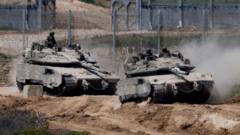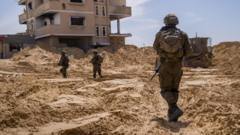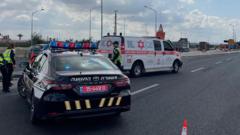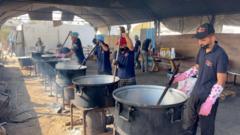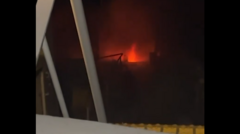The Israeli government is on high alert after a missile from the Iran-aligned Houthi rebels struck close to Ben Gurion Airport, injuring several. Prime Minister Netanyahu has vowed a strong response, linking the attack to Iran's influence. Meanwhile, the Houthis threaten to expand their aerial campaign against Israeli targets, heightening tensions in the region.
Netanyahu Promises Retaliation Over Houthi Missile Attack Near Ben Gurion Airport
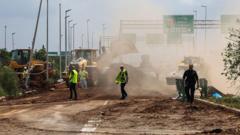
Netanyahu Promises Retaliation Over Houthi Missile Attack Near Ben Gurion Airport
Following a missile attack by Yemen's Houthi movement near Israel's primary airport, Prime Minister Netanyahu threatens to respond firmly, intensifying the regional conflict.
Israeli Prime Minister Benjamin Netanyahu has announced a promise of retaliation following a missile strike attributed to the Houthi group, which hit near Ben Gurion Airport, the country's main aviation hub. In a video shared on social media, Netanyahu stated, "We attacked in the past, we will attack in the future," indicating a resolute approach towards responding to threats from Yemen's Iran-backed rebels.
The missile, which landed near the main terminal on Sunday morning, caused injuries to four individuals, while two others sustained injuries during their rush to seek shelter. However, reports suggest none of the injuries were severe. The attack prompted the Houthis to declare an impending "aerial blockade" on Israel, committing to target Israeli airports continuously. This threat was announced in retaliation to perceived Israeli intentions to escalate military activities in Gaza.
Israel's Defense Minister, Israel Katz, reinforced Netanyahu's stance, asserting, "Anyone who hits us, we will hit them seven times stronger." Netanyahu further implicated Iran, suggesting that the recent Houthi attack could be an extension of Iranian hostilities, declaring that Israel would respond decisively "at a time and place of our choosing."
Witness accounts and unverified footage shared online depicted an immediate threat, with civilians on nearby roads seeking cover as the missile struck, generating a significant plume of smoke. Israeli authorities confirmed there was substantial damage to the area, revealing a crater from the impact but asserting that the incident did not severely disrupt airport operations.
Ben Gurion Airport, although briefly halting flights because of the attack, resumed operations later on Sunday, despite major airlines like Lufthansa, Air France, and Delta canceling several flights. Meanwhile, air raid sirens sounded throughout various regions as the missile approached, revealing deficiencies in Israel’s air defense systems, including its long-range Arrow system and a US-made Terminal High-Altitude Area Defense (Thaad) battery, which reportedly failed to intercept the missile.
Israeli officials confirmed that Netanyahu is set to convene a meeting with ministers and defense personnel to strategize on the country's response, amidst growing tensions involving the Houthis and regional implications of Iranian influence. The Houthis have consistently demonstrated military capability against Israel and have recently escalated their assaults on maritime targets, leading to a U.S.-backed bombing campaign against them.



